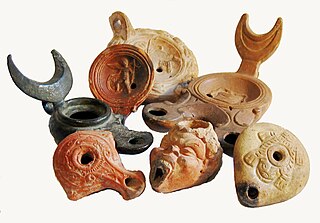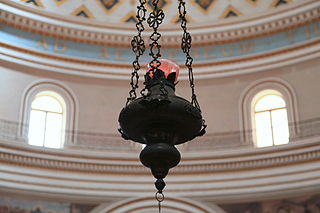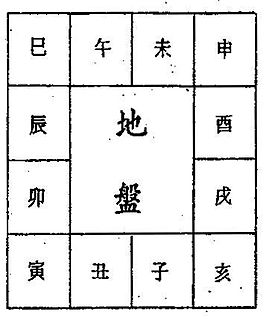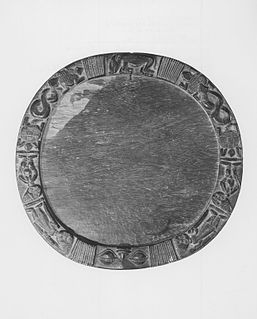
Divination is the attempt to gain insight into a question or situation by way of an occultic, standardized process or ritual. Used in various forms throughout history, diviners ascertain their interpretations of how a querent should proceed by reading signs, events, or omens, or through alleged contact with a supernatural agency.

Fortune telling is the practice of predicting information about a person's life. The scope of fortune telling is in principle identical with the practice of divination. The difference is that divination is the term used for predictions considered part of a religious ritual, invoking deities or spirits, while the term fortune telling implies a less serious or formal setting, even one of popular culture, where belief in occult workings behind the prediction is less prominent than the concept of suggestion, spiritual or practical advisory or affirmation.

An oil lamp is a lamp used to produce light continuously for a period of time using an oil-based fuel source. The use of oil lamps began thousands of years ago and continues to this day, although their use is less common in modern times. They work in the same way as a candle but with fuel that is liquid at room temperature, so that a container for the oil is required. A textile wick drops down into the oil, and is lit at the end, burning the oil as it is drawn up the wick.

A sanctuary lamp, chancel lamp, altar lamp, everlasting light, or eternal flame is a light that shines before the altar of sanctuaries in many Jewish and Christian places of worship. Prescribed in Exodus 27:20-21 of the Torah, this icon has taken on different meanings in each of the religions that have adopted it. The passage, which refers to prescriptions for the tabernacle, states:
And thou shalt command the children of Israel, that they bring thee pure oil olive beaten for the light, to cause the lamp to burn always. In the tabernacle of the congregation without the veil, which is before the testimony, Aaron and his sons shall order it from evening to morning before the LORD: it shall be a statute for ever unto their generations on the behalf of the children of Israel. (KJV)

Pyromancy is the art of divination by means of fire.
Axinomancy is one of several obscure methods of divination using an axe, hatchet, or (rarely) a saw. Most of the methods involve throwing an axe into the ground, or swinging it into a tree, and interpreting the direction of the handle or the quivering of the blade. A form of this is axiomancy; this is when the quivering of the blade of an axe that has been thrust into a wooden table is interpreted by the diviner.

Alomancy, also called adromancy, ydromancie, idromancie, and halomancy, is an ancient form of divination. Similar to many other forms of divination, the diviner casts salt crystals into the air and interprets the patterns as it falls to the ground or travels through the air. The diviner can also interpret patterns formed from the residue of a salt solution as it evaporates in the bowl. The exact interpretations are unknown, but it probably follows a similar method to aleuromancy.

Alectryomancy is a form of divination in which the diviner observes a bird, several birds, or most preferably a white rooster or cockerel pecking at grain that the diviner has scattered on the ground. It was the responsibility of the pullularius to feed and keep the birds used. The observer may place grain in the shape of letters and thus discern a divinatory revelation by noting which letters the birds peck at, or the diviner may just interpret the pattern left by the birds' pecking in randomly scattered grain.

Scapulimancy is the practice of divination by use of scapulae or speal bones. It is most widely practiced in China and the Sinosphere, but has also been independently developed in the West.

Astragalomancy, also known as astragyromancy, is a form of divination that uses dice specially marked with letters or numbers.

The traditional beliefs and practices of African people are highly diverse beliefs that include various ethnic religions. Generally, these traditions are oral rather than scriptural and passed down from one generation to another through folk tales, songs, and festivals, include belief in an amount of higher and lower gods, sometimes including a supreme creator or force, belief in spirits, veneration of the dead, use of magic and traditional African medicine. Most religions can be described as animistic with various polytheistic and pantheistic aspects. The role of humanity is generally seen as one of harmonizing nature with the supernatural.
Libanomancy is a divination primarily through observing and interpreting burning incense smoke, but which may include the way incense ash falls as well. Like most other methods of divination, during libanomancy a specific question must be asked. The incense smoke provides an answer, but the smoke must be interpreted by a diviner. Libanomancy may be considered a pseudoscience.

Da Liu Ren is a form of Chinese calendrical astrology dating from the later Warring States period. It is also a member of the Three Styles of divination, along with Qi Men Dun Jia (奇門遁甲) and Taiyi (太乙).

Various forms of witchcraft and divination are mentioned in the Hebrew Bible, generally in a disapproving tone.
Fangshi were Chinese technical specialists who flourished from the third century BCE to the fifth century CE. English translations of fangshi include alchemist, astrologer, diviner, exorcist, geomancer, doctor, magician, monk, mystic, necromancer, occultist, omenologist, physician, physiognomist, technician, technologist, thaumaturge, and wizard.

The Sandobele are members of the Sandogo, an authoritative women's society of the Senufo people, who practice divination. The Senufo inhabit the savannas and tropical rain forests of northern Côte d'Ivoire and the nearby land in Mali and Burkina Faso. The Sandogo is responsible for sustaining positive relationships with the spirit world through divination and for protecting the purity of each kinship group. The word Sandobele originates from the Senufo language.

An ọpọ́n Ifá is a divination tray used in traditional African and Afro-American religions, notably in the system known as Ifá and in Yoruba tradition more broadly. The etymology of opon, literally meaning "to flatter", explains the artistic and embellished nature of the trays, as they are meant to praise and acknowledge the noble work of the Babalawo (diviners). The etymology of the term Ifá, however, has been a subject of debate. Ifá may be considered an orisha, or a Yoruba god — specifically, the god of divination Orula. Conversely, some scholars have referred to Ifá merely as the "great consulting oracle" as opposed to a god or a deity, without any divine connotations.

Greek divination is the divination practiced by ancient Greek culture as it is known from ancient Greek literature, supplemented by epigraphic and pictorial evidence. Divination is a traditional set of methods of consulting divinity to obtain prophecies (theopropia) about specific circumstances defined beforehand. As it is a form of compelling divinity to reveal its will by the application of method, it is, and has been since classical times, considered a type of magic. Cicero condemns it as superstition. It depends on a presumed "sympathy" between the mantic event and the real circumstance, which he denies as contrary to the laws of nature. If there were any sympathy, and the diviner could discover it, then "men may approach very near to the power of gods."
Mesopotamian divination was divination within the Mesopotamian period.

African divination is divination practiced by cultures of Africa.
















